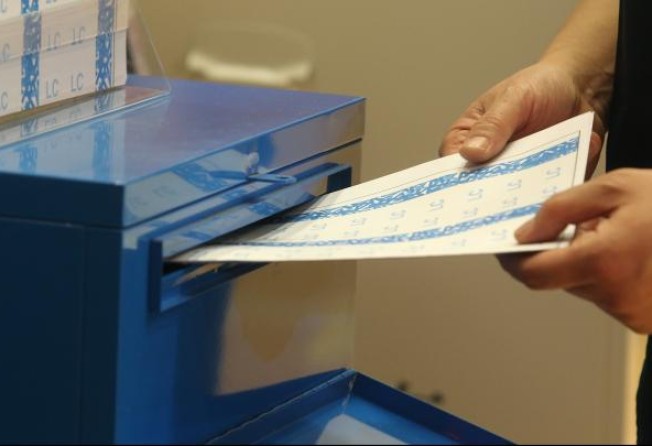Vote to maintain Hong Kong's identity
Philip Bowring says, civic duty aside, Hongkongers should turn up at the ballot box today to make this clear: above all, they reject the plan to speed up integration with the mainland

It is election day. If you are eligible and have not already voted, please do so as soon as possible. For sure, the limited nature of Hong Kong's democracy limits the value of just one vote. Nonetheless, it is hard to complain either about the government or the limited franchise if you do not use what you have.
You may not know who to vote for. It is amazing how many long-time resident foreigners have little grasp of who is who in local politics. Understandably, they may also be baffled by the mechanics of the new so-called super seat election of district councillors in which all can vote if they do not qualify to vote in one of the functional constituencies. So here is my voting guide, followed by the reasons for it.
In the geographical constituencies, do not vote for any of the candidates of the Democratic Alliance for the Betterment and Progress of Hong Kong or the Federation of Trade Unions. Both are the mainstream Communist Party United Front operations and will ultimately always put the party's interest, and that of Beijing, before their proclaimed commitment to democracy, Hong Kong and the welfare of the middle- and lower-income groups. On all but minor issues, they can be relied on to support whatever the executive-led government wants.
Do not vote, either, for the Liberal Party, which will be grossly overrepresented in the Legislative Council, thanks to the small-circle business groups of the functional constituencies.
So which of the mainstream, liberal democratic parties - the Democratic Party or Civic Party - should one vote for? Or should one go for the apparently radical People Power, or one of the parties built around a single individual? On the choice between Democratic and Civic parties, much should depend on the quality of the candidate or on tactical voting in the hope of maximising non-communist representation.
People Power may attract democrats of radical inclination - though many may find its tactics unappealing and some question its backing and motives.
That leaves what are effectively one-person parties of the likes of Regina Ip Lau Suk-yee's New People's Party's and Cyd Ho Sau-lan's Labour Party. As individuals, such people have merit, with reputations for being active and independent-minded. However, their existence has added to the problem of fragmentation of the non-communist camp.
Next is the question of voting for the district council seats. First, ignore the People Power call to boycott this ballot: vote for one of the Democratic Party candidates, Albert Ho Chun-yan or James To Kun-sun, or for Frederick Fung Kin-kee, the hard-working one-man band of the Association for Democracy and Peoples' Livelihood who previously represented Kowloon West.
In the end, the pro-government camp will keep control of the legislature but it matters a lot who and how many other voices are heard. It also matters that Leung Chun-ying be given an early lesson in public dissatisfaction with his record to date.
It may seem unfair to take swipes when he has been in office just two months. He deserved to win the chief executive selection, if only because his opponent was so incompetent. But there are already a number of disturbing aspects to his performance.
Most shocking, if only because the decision was entirely his, has been the appointment as development secretary of a man whose household has been supplementing its already high income at the expense of low-wage earners in subdivided flats. One would have thought that revelations of bureaucratic greed that surfaced in the last days of Donald Tsang Yam-kuen's administration would have made Leung sensitive to this issue. But, as with the Communist Party, different rules apply. Not backing down in the face of popular outrage is more important than the principles of good government.
Now we have the national education issue, which goes to the heart of what gives Hong Kong its own identity, a special part of China in the same way as, for example, the Basque region is a special part of Spain. For sure, national education pre-dates Leung. But Leung has allowed it to become a big issue. People can see it is not just a means of teaching more Chinese history but of teaching history doctored to suit a party which was once cruel and is now simply corrupt.
In turn, that focuses attention on how far Leung is committed to Beijing's goal of speeding up the integration of Hong Kong into the mainland through physical links, easing of flows of people, and participation in national flag waving over the Senkaku/Diaoyu Islands, etc, rather than focusing on its Asian and international business role and the separate institutions that support that.
Emphasising Hong Kong's identity is not anti-national. It simply acknowledges that it has special characteristics derived from history and Cantonese traditions that it wants to preserve. It is hard to see how Hong Kong can retain its own legal and other systems once the border with Shenzhen dissolves. Hong Kong's special position is based on relations with the outside world, not on its most immediate neighbour. Integrated, Hong Kong will be a second- or even third-tier city in China, the Trieste or Tangier of the nation. Go vote against that.
Philip Bowring is a Hong Kong-based journalist and commentator. His wife is a Civic Party candidate in Kowloon West